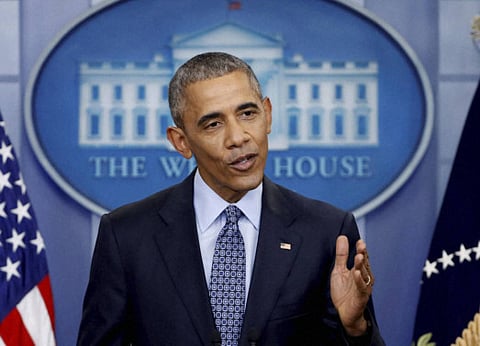Motives behind Obama’s delayed Palestine move
The UN resolution will give added legitimacy to calls for Israel’s isolation besides strengthening the Palestinian leadership in its negotiations

In his waning days as president of the United States, Barack Obama expressed his long-simmering disappointment with Israeli Prime Minister Benjamin Netanyahu and his policies in the Occupied Territories. On December 23, 2016, the US abstained from using the veto to overrule United Nations Security Council (UNSC) Resolution 2334, which condemned as illegal the construction of Israeli colonies in the West Bank and occupied East Jerusalem. The abstention at the UNSC was seen as an attempt by the Obama administration to curb the enthusiasm of the incoming Trump administration towards Israel’s policies, including the construction of colonies in the Occupied Territories.
The text of Resolution 2334 makes clear that “the cessation of all Israeli colony activities is essential for salvaging the “two-state solution”. The UNSC also made it clear that it deemed any de-facto changes to the reality on the ground in the Occupied Territories to be illegitimate, unless agreed to by both parties through negotiations as part of the Israeli-Palestinian peace process.
The Obama administration’s belated decision to take a “tough” stance against Israeli colony activity is rooted in a number of factors.
First, it was driven by a deep sense of disappointment towards Netanyahu’s persistent effort to derail every single attempt to bring to an end the Palestinian-Israeli conflict. In his first term, Obama had made a pledge to succeed where numerous others had failed, i.e. the conclusion of an Israeli-Palestinian peace agreement and the creation of a viable, geographically contiguous Palestinian state side-by-side a secure “state of Israel”. For his part, Kerry was personally involved in US mediation efforts to achieve Israeli-Palestinian peace since his appointment in 2013. Israeli intransigence, however, destroyed any hope amounting even to a framework agreement between the two sides.
Second, the Obama administration adopted the view that the construction of Israeli colonies in the Occupied Territories has been the main obstacle to a lasting Israeli-Palestinian peace agreement. The White House has watched as the number of Israelis living in those illegal colonies has increased by 100,000 since Obama took office in early 2009.
Third, the Obama administration believed that the window of opportunity for a two-state solution may soon close: With the Israeli government inching towards a state of permanent occupation, a one-state solution of sorts is emerging on the ground, with Israel governing not only the Palestinians of Israeli citizenship, but the close to five million Palestinians who live in the Occupied Territories. In a follow-up statement, former US secretary of state John Kerry made a direct allusion to the possibility that if Israeli colony expansion went on unchecked, a future Israeli government would face the prospect of a wide-scale civil rights movement demanding equal voting rights for Palestinians in the West Bank.
Fourth, Washington’s refusal to veto UNSC 2334 can also be viewed as the culmination of its strained relationship with the Netanyahu government. Difficulties between the two sides have been aired in public, with Israeli officials publicly humiliating Obama and Kerry, and Netanyahu openly endorsing Obama’s Republican challenger, Mitt Romney, during the 2012 presidential campaign. By 2015, Netanyahu even responded to an invitation from Republican lawmakers to address the US Congress, to try to dissuade them from adopting the Iran nuclear agreement — a direct affront to Obama, who had opposed the visit.
Finally, the Obama administration’s refusal to veto UNSC 2334 can be seen as a means of limiting the damage that could be done by the new administration, given the widely-held view that Trump may end up undoing decades of standing US policy towards the Israeli-Palestinian conflict. This includes the possibility of moving the US Embassy from Tel Aviv to occupied Jerusalem — as Trump’s candidate for US ambassador to Israel, colony proponent David Friedman, would reverse American support for the birth of an independent Palestinian state.
The Obama administration’s concession that Israel is to blame for the failure so far of the Middle East peace process has come very late in the day. It is also unlikely to impact Israeli policy significantly. Given that Resolution 2334 is technically “non-binding”, the Israelis can very likely continue with business as usual.
Nonetheless, the consequences for international law are important, especially as the UNSC has now fully endorsed the idea that the Occupied Territories include occupied East Jerusalem, undermining Israeli claims that these are merely “disputed” or contested boundary disputes. Similarly, the text of the resolution will give added legitimacy to calls for its isolation and the imposition of sanctions on the country, not to mention its strengthening of the Palestinian leadership’s negotiating position and its capability to bring international legal proceedings against Israel for its colony policies.
Dr Marwan Kabalan is a Syrian academic and writer.


